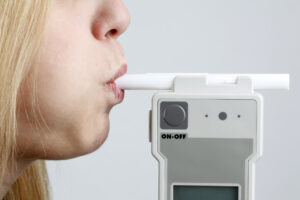Utah Law states that if you drive a vehicle within the state, you have given implied consent to submit to a chemical test including a breath sample, blood sample, oral fluid sample, or urine test to determine the alcohol level or intoxicants within your system if requested by a law enforcement officer.

Suppose an officer pulls you over because they believe you are driving under the influence of alcohol. They may administer a preliminary breath test and place you under arrest. Then, if the police officer requests you take a breathalyzer test or intoxilyzer test, and you are refusing a breath test, the consequences can be severe.
You are not allowed to choose the type of sobriety test (breath or blood) administered. If the arresting officer deems they have reasonable grounds to issue a roadside breath test but states there was a breath test refusal, you may receive a refusal charge, a criminal penalty, and lose your driver’s license for 18 to 36 months, depending on your criminal history. Had you simply submitted to the breathalyzer test or intoxilyzer test, you would not lose your driver’s license or driving privilege for as long.
If I could give one piece of advice to Utah citizens regarding DUI conviction, it would be: if under arrest, DON’T REFUSE THE TEST! If you refuse the test, the officer will quickly get a warrant, sometimes while still on the road and not even at the police station, and conduct a test anyway. Oftentimes against your will, especially if you refuse a chemical breath test. They will literally hold you down and draw your blood.
Defending Against Refusing to Take the Breathalyzer Test
An experienced DUI defense attorney can assist you in defending against allegations of refusal at the DLD hearing, which you must request within 10 days of your arrest. It is possible that the officer did not properly advise the defendant of the consequences of refusal or that the defendant did not actually refuse but was given misinformation or poor legal advice by the officer, which caused the driver’s refusal. It is also possible that the officer did not collect the deep lung air necessary to perform the test properly. Your DUI attorney will request information regarding the device used to conduct the test, the test result, and examine the defendant’s blood alcohol content.
If the DLD revokes your license for 18 months due to refusal, you can request the DLD to review their decision and that the District Court review the administrative revocation.
To find refusal, the hearing officer or court must ultimately conclude that the person clearly indicated that they refused to take the breathalyzer test, intoxilyzer test, or other field sobriety test after being properly and fully admonished of the legal obligation to submit to a test and the consequences of refusing.
A refusal allegation attached to a DUI charge can make a challenging situation even more difficult. If the “Refusal” box on your DUI Summons and Citation is checked, contact Bangerter Law Firm immediately to discuss your options. Without proper action and defense, you could face a license suspension of 18 months before your criminal case even makes it to court.

